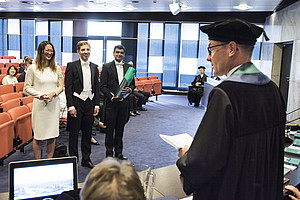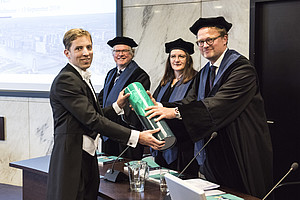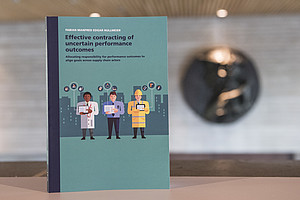ERIM PhD Defence Fabian Nullmeier

In his dissertation ‘Effective contracting of uncertain performance outcomes: Allocating responsibility for performance outcomes to align goals across supply chain actors’ Fabian Nullmeier examines how organizations can effectively contract and sell uncertain performance outcomes.
Fabian Nullmeier will defend his dissertation in the Senate Hall at Erasmus University Rotterdam on Friday, 13 September 2019 at 11:30. His supervisors were Prof. Finn Wynstra (RSM) and Prof. Erik van Raaij (RSM). Other members of the Doctoral Committee are Prof. Martin Spring (Lancaster University), dr. Wendy van der Valk (Tilburg University), Prof. Jan van den Ende (RSM), Prof. Michael Essig (Bundeswehr University Munich), Prof. Jan Dul (RSM) and Prof. Michaéla Schippers (Erasmus University).
Fabian Nullmeier's PhD research project is conducted within the Erasmus Doctoral Programme organised by Erasmus Research Institute of Management (ERIM), the joint research institute of Rotterdam School of Management (RSM) and Erasmus School of Economics (ESE) of the Erasmus University Rotterdam (EUR).
About Fabian Nullmeier

Fabian Manfred Edgar Nullmeier was born in the year 1989 in Frankfurt am Main, Germany. He received a Bachelor of International Business Administration degree from Rotterdam School of Management, Erasmus University in 2011. He continued his studies at Erasmus School of Economics and received a Master of Science degree in Accounting, Auditing & Control in 2013. In the same year, he received a Master of Science degree in Supply Chain Management from Rotterdam School of Management, Erasmus University.
In June 2015, Fabian started his PhD in the Supply Chain Management section of the department of Technology and Operations Management at Rotterdam School of Management, Erasmus University under the supervision of Prof. dr. Finn Wynstra and Prof. dr. ir. Erik van Raaij. In his research Fabian focuses on the performance management processes that enable organizations to effectively utilize performance-based contracting in uncertain environments. Fabian’s research interests lie at the intersection of performance-based contracting, inter-organizational relationships, and behavioral operations management. During his time as a PhD student Fabian attended several international management conferences to present his research, such as the Academy of Management Conference, Decision Sciences Institute Conference, and International Purchasing and Supply Education and Research Association Conference.
On the 2nd of January 2019, Fabian started working as an Operations Consultant at Berenschot.
Thesis Abstract

This dissertation contributes to practice and literature by studying how organizations can effectively contract and sell uncertain performance outcomes. In Chapter 2, I study whether supplier shirking in response to outcome uncertainty can be mitigated by combining performance and behavior specification and evaluation. Based on the findings of this study, I advise purchasing managers to invest in the evaluation of performance and behavior to contain suppliers’ opportunistic behavior. In Chapter 3, I study what causes performance achievement to be uncertain, and how buyers can attenuate the effects. Based on the findings, I explain that outcome uncertainty is related to the roles and activities of buying organizations in the service exchange. To remedy the negative effects, I advise buyers to coordinate relevant activities of their organization with suppliers. In Chapter 4, I study how emotions, which are triggered by a failure to achieve performance outcomes, affect suppliers’ future motivation. Based on the findings, I advise purchasing managers to take into account the context specific factors and resulting emotions in determining when and how to use performance-based contracting. In Chapter 5, I study the supply chain-wide implications of acquiring property rights and obligations associated with selling performance outcomes. Based on the findings, I advise manufacturers to minimize the subsequent financial risks by investing resources in the alignment of incentives and operations across supply chain actors. Overall, this dissertation makes important theoretical advancements concerning goal alignment across supply chain actors through the use of contractual controls and distributions of property rights. In addition, the highlighted recommendations for practitioners, provide buyers and suppliers with detailed insights about how to effectively contract and sell uncertain performance outcomes.
Photos: Hans


